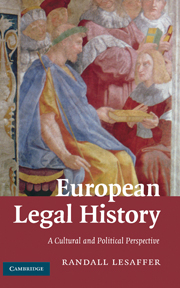1 - Introduction
Published online by Cambridge University Press: 15 August 2019
Summary
Quand on parle de l'amour du passé, il faut faire attention, c'est de l'amour de la vie qu'il s'agit; la vie est beaucoup plus au passé qu'au présent. Le présent est un moment toujours court, et cela même lorsque sa plénitude le fait paraître éternel. Quand on aime la vie, on aime le passé parce que c'est le présent tel qu'il a survécu dans la mémoire humaine. Ce qui ne veut pas dire que le passé soit un âge d'or: tout comme le présent il est à la fois atroce, superbe, ou brutal, ou seulement quelconque.
Marguerite Yourcenar, Les yeux ouverts.Towards a new ius commune?
The end of the Cold War and the integration of Europe
The end of the Cold War triggered an acceleration in the process of European integration. For France and Britain, the unification of Germany (1990) was only palatable if its power would be safely embedded within Europe. These countries feared they would be overshadowed by a strong and unified Germany and wanted to tie it down in the European structures. In 1992, the Maastricht Treaty transformed the European Community into the European Union (EU). Apart from the traditional economic and monetary integration, steps were taken towards greater co-operation in the field of foreign policy, defence and justice. In the 1990s, a timeframe was established for the introduction of a single currency, which became a fact on 1 January 2002. Moreover, the collapse of the communist bloc paved the way for the expansion of the EU to the east. In 2004, ten new member states acceded to the EU, most of them former Eastern bloc countries; in 2007, Bulgaria and Romania joined. The rejection of the European constitution by French and Dutch voters in 2005 put an – at least temporary – end to this period of accelerated integration and left the European Union facing an uncertain future. Nevertheless, Europe is today more a fact of life than it was before.
In the climate of renewed Euro-optimism in the 1990s and the early years of the twenty-first century, the idea of a unified European law made headway. This applies primarily to private law and much less to public law.
- Type
- Chapter
- Information
- European Legal HistoryA Cultural and Political Perspective, pp. 1 - 14Publisher: Cambridge University PressPrint publication year: 2009



